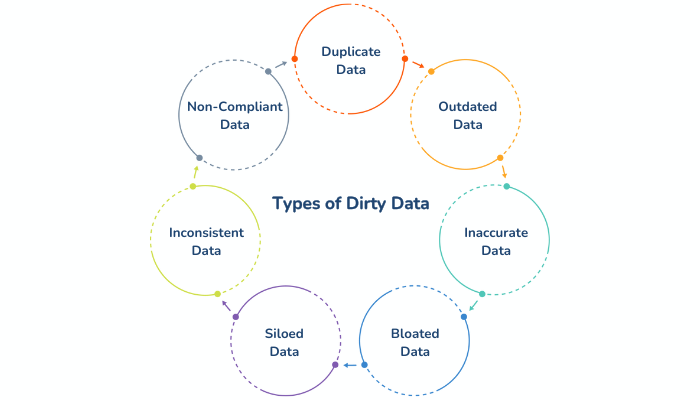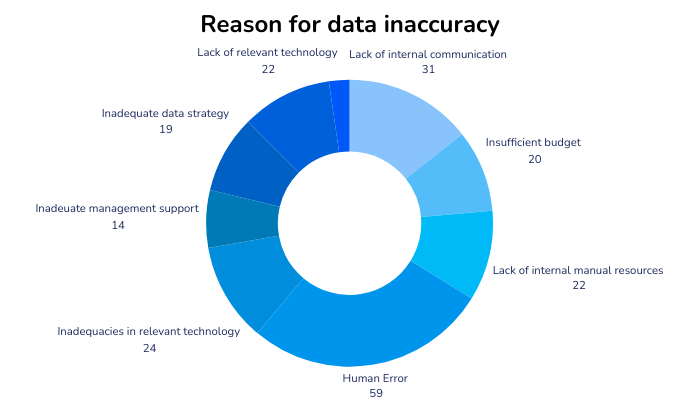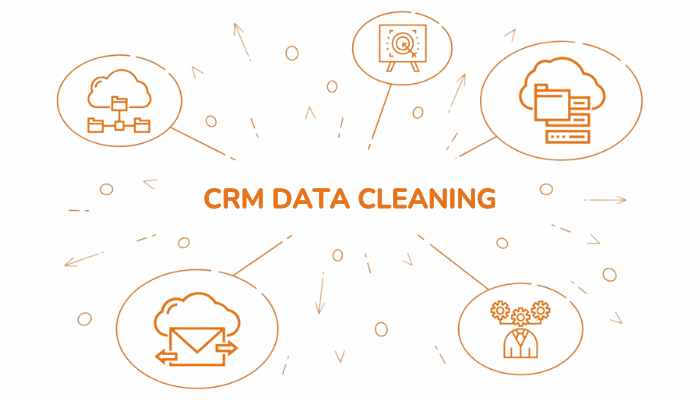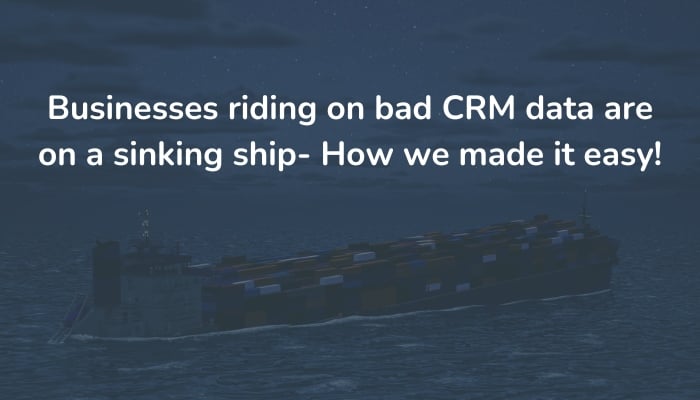Signs dirty data is causing your business more damage than you think and how you can fix it!
CRM is much more than a glorified contact book for businesses. It is software that does it all. It manages customer data, streamlines workflows, and tracks sales. It automates communication with existing and potential customers, automates tasks for the employees, enhancing operational efficiency, and optimising productivity. The issue, however, begins when even the best CRM software has bad and inaccurate data showing up. Suddenly, the sales team can’t reach out to potential customers, the customer relationship team doesn’t have a purchase history, and the marketing team is basing its entire strategy on incorrect and inconsistent data, leading to ineffective marketing strategies. Businesses riding on bad CRM data are on a sinking ship. It is not a matter of if but when.

Data, the backbone of businesses, brings in its share of problems. Apart from handling its volume, businesses face the challenge of keeping it clean. The concept of GIGO (Garbage In Garbage Out) becomes more real than ever in this part of the world. Businesses lose around 25 percent of revenue owing to bad data. Every business, at any point in time, sends emails to incorrect addresses, reaches out to customers who aren’t interested in their products, and doesn’t contact the “valued” ones who matter, not knowing who to hire- losing leads and killing growth. Furthermore, studies by IBM and Harvard show that U.S. companies lose around $600 billion yearly due to bad data. However, things become trickier because this report by Data Warehousing Institute shows that almost 50 percent of survey respondents out of 647 have no plans in the pipeline for CRM cleanup, and 78 percent accepted the need to have thorough education about data governance.
The biggest roadblock in CRM data maintenance is businesses putting undue importance on garnering data but not cleaning and maintaining its quality, which is evident from the fact that 33 percent of companies have more than 100,000 records, but 25 percent of businesses accept that it could be inaccurate. This makes CRM cleaning services indispensable for businesses that want to chart a success story in the data-first omnichannel landscape of today.
What constitutes CRM data?

CRM Business data is the backbone of any business. It includes any form of customer data (collected from the customer support team, helpdesk, live chat, email lead forms, targeted ads, email IDs collated online and offline, purchase history) and analytics data such as page views, social media interactions, CTR, and website traffic.
But what exactly is dirty data, and how does it enter the CRM?
Dirty data, or rogue data, is simply misinformation or unreliable information in the CRM. It could be an incorrect phone number, a typo in email IDs, an incorrect apartment number, or duplicate or missing fields. Anything related to data that impedes businesses from making numbers, reaching out to potential or existing customers, or missing opportunities is owing to bad data.
These are some types of dirty data a business has to deal with:

Duplicate data:
When the same information is entered into the system multiple times and in different manners, it is hard to track. This may or may not be a business’s fault. Customers may register twice or with different email IDs, leading to duplicate records. An Experian study reveals that 94 percent of organisations believe they have inaccurate customer data. Additionally, another study states that data duplication rates may go as high as 30 percent without data cleaning best practices. Unfortunately, this isn’t as simple as it sounds. As we usher into the omnichannel ecosystem, data quality is the key to seamless integration and enhanced customer experience. A marketing team sending the same communication to a single customer thrice a day is a huge waste of productivity and resources. Not to mention ineffective marketing campaigns and annoyed customers who unsubscribe or block the sender.

Outdated data:
People change jobs, addresses, and cities. Businesses change faces and, sometimes, even names. An outdated CRM data that doesn’t include the latest and updated information is unreliable. If a customer’s latest purchase history isn’t logged in the system, the marketing team misses out on upselling opportunities. Besides, businesses may completely miss out on providing personalised experiences, resulting in terrible customer experiences and misguided marketing efforts.
Inaccurate and incomplete data:
One of the major CRM data decays is attributed to inaccurate information. A typo here, a wrong phone number, or a blank there, and voila, your business is inundated with null/void fields that can only result in missed windows and closed doors.
Bloated data:
Data redundancy is a black hole for businesses that tend to absorb all marketing and sales efforts to the point of no escape. Imagine a clutter so messy, inefficient, and complex that it is difficult to achieve anything out of it. Businesses, in their bid to garner more data through web forms, external referral forms, PR, and promotional activities, indulge in vanity exercises that result in inflated data. Style over substance. Quantity over quality.
Siloed data:
For data analytics services to work, data must be unrestrained and free-flowing. It reduces collaboration and reduces the visibility of data as a whole.
Also read: Using data analytics solutions for business decision-making
Inconsistent data:
The primary cause of inconsistent data is the lack of uniformity and standardisation. It could be due to different formats, systems, and sources. It might look innocent, but the sales and engineering team recording model numbers differently leads to them being skipped out of the monthly sales figure.
Non-compliant data:
Privacy violations and non-compliance with GDPR CRM data lead to the failure of business projects. This Bitkom survey found that only 20 percent of the 500 respondent businesses have GDPR-compliant CRM data. Another study reveals that only 33 percent of businesses in Germany have partially implemented GDPR CRM data, leading to tarnished business reputation, data leaks and fines.
For a business, this data decay might happen in separate incidents and doesn’t seem like a red flag, but in reality, it is a nuclear reaction, the first domino in the event. The lack of CRM data hygiene often masks underlying problems and is often the tip of the iceberg. It can single-handedly derail a business’s growth. To help prevent these issues, incorporating Microsoft Consent Mode ensures that user consent preferences are respected before CRM data is collected or processed, strengthening data governance and reducing the risk of compliance failures.
Here are the signs that businesses should be wary of managing data quality and ensuring they are on top of their data hygiene game.
Your team is wasting time:
If your sales team is reaching out to customers, yet most of them are inaccurate or not reachable, chances are your business is dealing with an inaccurate CRM contact database. This results in frustration and work hours spent on unproductive tasks, such as getting the contacts right. According to a report, the sales team spends about 23 percent of their time daily fixing data. Since the sales team doesn’t have proper training and understanding of data quality, the time spent on getting the data entry doesn’t justify its quality. Recognizing top-performing employees with a luxury art glass award can be a great way to motivate your team and celebrate their achievements.
A CRM does much more for a business. It aids lead generation and offers a holistic, complete picture of data across verticals. Dropped calls, monthly revenues taking a hit consecutively even after doing everything right, and lower morale could be signs that bad CRM data is creeping in and it is time to hire a CRM data cleaning services provider.
Your emails are not getting delivered:
If only it were that straightforward. Bad CRM data means a business’s email marketing campaigns are highly ineffective. The marketing team spends money chasing customers that aren’t the right profile. In times when targeted email marketing can be an effective tool to reach out to customers, right from the sign-up to cross-selling, data decay in the CRM database just hands you over a dud.
You don’t know your customers anymore:
The lack of CRM data hygiene leads to customer data being grouped into wrong segments. As a result, emails don’t reach the intended decision-makers, the sales pipeline is broken, the marketing team misses out on creating a promotional strategy that resonates with the customers and loses out on upsell and cross-selling opportunities of customer acquisition, and the customer support team have increased workload with unexpected delays in resolution and hence, businesses face a revenue leak. The lack of CRM data cleaning leads to inefficient customer support processes and distrust of the system. The customer support team doesn’t have a holistic view of tickets; they can’t streamline support tickets or view the latest purchases or customers logged in to their system. Implementing CRM project management can help address these issues by ensuring that customer data is properly maintained, leading to better collaboration between teams and more effective customer interactions.
You are wasting money:
Bad data has a snowball effect on the sales pipeline. A blank field, an incorrect address or a name that doesn’t seem much initially can make the sale cycle incredibly and arduously tedious. This increases marketing costs, making new customer acquisitions difficult, time-consuming, and expensive.
You don’t know your data:
Businesses need data to flow freely within processes and teams. However, a dirty CRM database implies reduced transparency and siloed data without visibility across departments. If the data is being slipped into cracks, you don’t have a complete picture of the data, and there is a massive disconnect between the data you see and the actual one. Result- you have lost the plot.
Now that we have covered what causes bad CRM data and why your business needs CRM data cleaning, let’s see how you can get on top of it.

CRM data cleaning isn’t a one-off activity. The lack of it leads to financial fraud, non-compliance with global laws, and revenue leaks. If businesses aren’t keen on CRM data hygiene, it creates a domino effect and unprecedented revenue losses.
With BizProspex, CRM data cleaning is made easy, streamlined and affordable. As a leading data cleaning service provider, we are here to help businesses identify the gaps in CRM data and bridge them. Our team ensures data cleaning best practices are implemented across the data available verticals using the best data cleaning tools. This ensures that your business’s CRM data remains fit for intended usage. Our range of CRM data cleaning tools and integrated data management tools is equipped with machine learning and AI capabilities to ensure the quality of your business data.
We believe that human intervention is indispensable. Hence, our data engineers and analysts work with you to automate data management and enrichment. We help your business create a CRM data governance framework and have a CRM data quality check list in place.
If you are interested in our CRM data cleaning services or want to know more about how we can help you give your data a good scrub, contact us here.

